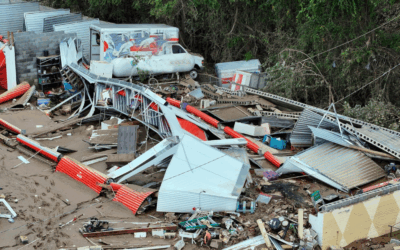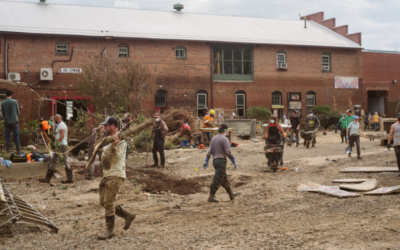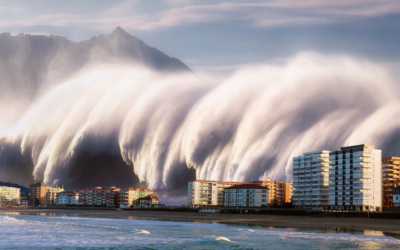
Natural Disaster

FEMA May Receive More Funding Despite Being Largely Useless Agency
Take A Poll About This Problem via Poll2Action North Carolina lawmaker David Rouzer once again introduced a bill in 2025 that aims to provide states and Indian Tribes with increased assistance in the wake of natural disasters. A congressional summary of HR 316 reads as follows: “This bill establishes Federal Emergency Management Agency (FEMA) funding sources for unmet needs caused by major disasters, expands FEMA’s assistance for housing and home repair, and requires certain considerations in FEMA’s recommendations on presidential emergency/disaster declarations.” It further states that it will establish “the National Disaster Recovery Reserve Fund for FEMA to provide grants to states and Indian tribal governments for unmet need. The bill defines unmet need as any necessary expense for activities related to a declared major disaster, including disaster relief or resilience activities. (RELATED: Energy Department Admits Millions Of Americans Are At Risk Thanks To Grid Vulnerabilities) In addition, the bill authorizes FEMA to set aside funding from the Disaster Relief Fund to provide grants to states and Indian tribal governments for unmet needs resulting from a declared disaster, including home repair, economic recovery measures, and other services assisting disaster victims.” Recent reports from Western North Carolina suggest that FEMA does not actually allocate any of the deeply needed funding, nor does it rarely have anyone qualified to make those calls employed during times of emergency, so it is unclear why FEMA is being given any more money. Read HR 316 In Full How Do You Feel? Take The Poll Did you know that lawmakers, business leaders, and even public servants use polling data to inform their policies and practices? These might seem like simple questions, but answering them can have far-reaching impacts on the world around you. We are hoping that Poll2Action will soon start sharing their data with the masses, helping to guide policy in a way that no other polling company has done before. As soon as we know more about where to find these data, we will let you know! The responses you give to our polls don’t just sit in the random void of nothingness that is most of the Internet. Your voice goes beyond these white pages and into the ears and eyes of real change makers — so THANK YOU for helping shape our future, today.

‘If I Was Waiting For FEMA, I Would Be Screwed’: You’ll Sob Watching What’s Happening In NC Months After Hurricane Helene
This article also appears on Million Voices. If Christians organizations hadn’t stepped in to financially and practically support the victims of Hurricane Helene in Western North Carolina, a majority of estimated 10,000 square miles devastated would still be in ruin. A video shared by one of YouTube’s most successful and watchable creators, Peter Santenello, in June revealed what is really happening in western North Carolina more than half a year after the region was devastated by Hurricane Helene. It is hard to describe the sheer scale of the destruction, with some estimates suggesting anywhere from 250 to more than 500 lives lost in the extreme weather event that flattened much of the region. Entire towns were destroyed in a matter of hours as landslides and biblically-enormous torrents of water washed through the valleys and hollers that define the geography of Appalachia. Many areas are still without power, while others are barely receiving cell service thanks to the free provision of Starlink, a Bat Cave local legend and First Department chief Steve told Santenello. “That was a tremendous help,” Steve said of Starlink. Not even 911 was available to locals, making this arguably one of the worst natural disasters in modern American history. Watch the interview with Steve: Landslides, tornadoes, torrents of water over already saturated land led to the total washout of homes, bridges, and roads, rendering some areas inaccessible to this day. Santenello noted that many people have differing opinions on the emergency response from FEMA, so asked Steve for his take on the situation, as well as the temperature of the community as it relates to support from the state and federal government. Steve offered his personal story on the situation, detailing how his house was hit by a landslide. He didn’t tell anyone what had happened because he “had other things to do.” (RELATED: Hurricane Warnings Ramp Up For Summer With ‘Above Normal’ Forecast) “I was lucky, blessed enough to be able to stay in the house. I just had to shut off half of it, so I spent all my time rescuing and doing that sort of thing,” he told Santenello. “Well, when FEMA came in, you apply for it and all that. Right off the bat, the first thing was, ‘oh, we’ll get you a place to stay.’” FEMA offered him a place three counties away from his people, so Steve turned it down. “After that, my house had basically $20,000 worth of damage to it,” he continued. FEMA came to look at it “and they gave me $2,000.” Everyone kept Steve and others to keep appealing the decision, which he has done for months (seven at the time of filming), and nothing has changed. FEMA will not help him, just like they haven’t helped most of the people Santenello interviewed — and those who spoke to Million Voices on condition of anonymity. ‘Thank God For The Christian Organizations’ “Thank God for the Christian organizations,” Steve continued. “… ‘Cause they have come up and helped get me back. But if I was waiting for FEMA, I would be screwed.” Things have improved since “the politics changed after the election,” Steve clarified. “But before that it was terrible.” Still, some people are falling through the cracks, “and I think it’s just the bureaucracy of how big [FEMA] is.” (RELATED: Guys, We May Have Found The Most Addictive New Outdoors Show On YouTube) The biggest thing locals in WNC need right now is for the roads to be rebuilt. Without access, everything else is on-hold. Families are living almost a year post-Helene without any septic, forced to use buckets instead of bathrooms. “We’re just in a really bad position not having the real estate to be able to do kind of [rebuilding of roads],” Steve noted. Still, Christian and Amish organizations have stepped up where FEMA has failed, proving that the government is not your community. In the most dire situations, the government probably won’t come and help you. One group who have shown up to help is Spokes of Hope, the founder of which spoke with Santenello at length about his organization’s ethos of help. “I’m going to go straight Jesus on you,” Shane Zoccole said before he started. “At the end of the day, God tells His people He’ll never leave us or forsake us. And if we’re going to come to a town and say ‘Our God will never leave you or forsake you,’ and we leave in a couple [of] weeks, then we forsake them.” The Last Thing Jesus Said On The Cross “And what’s the last thing Jesus said on the cross? ‘It’s finished,’” Zoccolo continued. “We got to finish. That’s the way we do it, or we take people’s faith away.” Going to a disaster zone or mission and not finishing what you went there to do is no different to taking the Lord’s name in vain, Zoccolo added. “That’s not the way God works. He took it to the cross. All the way. If Jesus would have stopped two-third of the way and said, ‘that’s it, I spent enough.’” Zoccolo didn’t need to finish this thought, because we all know what would have happened if Jesus had quit what He came here to do. “Wake up, church! We need a capital ‘C,’” Zoccolo added. Psalm 133 A song of ascents. Of David. 1 How good and pleasant it is when God’s people live together in unity! 2 It is like precious oil poured on the head, running down on the beard, running down on Aaron’s beard, down on the collar of his robe. 3 It is as if the dew of Hermon were falling on Mount Zion. For there the Lord bestows his blessing, even life forevermore. Organizations To Donate To: United Cajun Navy: https://unitedcajunnavy.org/donate/ Precision Grading (ways to donate in Featured posts): Facebook/PrecisionGrading Bat Cave Disaster Relief: https://www.batcavedisasterrelief.com Spokes Of Hope: https://spokesofhopesc.com/ Operation Blessing: https://www.ob.org/ Excel College: https://www.theexcelcollege.com/disaster-relief Help Ben Rebuild (guy at the end of the video just getting into his house for the…

Mainstream Media Finally Wakes Up To Massive Geological Threat To US
A study published in late April has finally woken up the mainstream news media to the threat of the Cascadia Subduction Zone, a boundary that could reconfigure the physical landscape of the Pacific coast when it next shakes. The Cascadia fault stretches a startling 600(ish) miles from the northern reaches of California through to British Columbia, according to AccuWeather. Quakes in this region go mostly ignored, but only because a monstrous tectonic rupture hasn’t hit for an estimated 300 or more years. When Cascadia awakens, she shakes the West coast with a magnitude-9.0 quake for upwards of five minutes, often sending a tsunami upwards of 100 feet tall toward the shoreline, NBC reported. The latest study points to a new threat posed by the fault. “Along the Washington, Oregon, and northern California coasts, the next great Cascadia subduction zone earthquake could cause up to 2 m [6.5 feet] of sudden coastal subsidence, dramatically raising sea level, expanding floodplains, and increasing the flood risk to local communities,” the authors wrote. Where Is The Risk Area? Major cities in the risk area include Vancouver, Seattle, Portland, but also those to the north and south and eastwards in-land. “This lesser talked about hazard is going to persist for decades or centuries after the earthquake,” co-author Tina Dura told NBC. “The tsunami will come in and wash away and it’s going to have big impacts, don’t get me wrong, but the lasting change of the frequency of flooding … that’s going to have to be dealt with.” (EXCLUSIVE: 20,000,000 Sick Americans Abandoned By Medical ‘Oligarchy’ Controlled By Elites; Can We Fix It?) Fossil records suggest the land-drop during previous Cascadia quakes turned dry ground into tidal mudflats along estuaries throughout the Pacific Northwest. “That’s going to happen again and we’ve built up a lot of those areas,” she added. It’s a good time to remember that the most dangerous earthquake fault on the West Coast is the Cascadia Subduction Zone, not the San Andreas Fault. The Cascadia Subduction Zone is capable of producing a megathrust earthquake with a magnitude of 9.0+ and a resulting tsunami up to… pic.twitter.com/9znJ9Sz4tM — Colin McCarthy (@US_Stormwatch) December 5, 2024 When Can We Expect Another Quake? Cascadia last shook in 1700, with previous quakes hitting once every 450-500 years on average. The National Seismic Hazard Model estimates a 15% chance of a magnitude-8.0 or stronger quake within the next 50 years. (RELATED: Joe Pags Launches ‘Unshaken And Unafraid’ With Salem Media Group; WATCH The Epic Premiere Episode) Federal officials, experts, basically anyone who knows about Cascadia believes that when the quake hits, it will likely be the worst natural disaster in the nation’s history, with reports suggesting: 14,000 fatalities* 100,000+ injuries 620,000 buildings collapsed, including 100 hospitals and 2,000 schools There are more than 2,500,000 people living between Portland and Vancouver. We believe these estimates are conservative and only represent those killed by direct impacts from the earthquake and tsunami. “There’s the flood itself and then there’s the basically permanent change to land level at the coast and that has a big impact for what those communities have to plan for,” Pacific Northwest Seismic Network Harold Tobin explained to NBC. “Where are you going to put your school or hospital? Where are you going to build your transportation network? I think it’s important to take the long view.” Long-term Planning Shortened Pain A great failure of the western mindset is our ignorance of time. We eat news in three meals a day, throw out fads faster than seasons change; we replace our politicians rapidly — and this is a good thing, as we all know how power corrupts. But we must reshape our thinking toward the natural world. We do not dominate our physical landscape. We are placed here as shepherds, existing at the will and mercy of our living planet. It would be wonderful if everyone could shut up about “issues like climate change” and instead learn to live in symbiosis with the things God gave us so we can prosper for generations to come. We hope to foster an environment of common sense education around the world and all her processes here at The Modern Memo.
